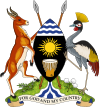
Communications in Liberia include the press, radio, television, fixed and mobile telephones, and the Internet.
Telecommunications in Nigeria include radio, television, fixed and mobile telephones, and the Internet.
There are a number of systems of communication in Uganda, including a system of telephony, radio and television broadcasts, internet, mail, and several newspapers. The use of phones and the internet in Uganda has rapidly increased in the last few years.
Telecommunications in the Gambia includes radio, television, fixed and mobile telephones, and the Internet.
The New Vision is an English-language newspaper published daily in print form and online.
Internal Security Organisation (ISO) is the Uganda government's counter intelligence agency responsible for providing national security intelligence to Uganda's policy makers. It also engages in covert activities at the request of the President of Uganda. Founded in 1986, the organisation took over the duties first performed by Military Intelligence. Its headquarters are in Nakasero, Kampala.
The Daily Monitor is a Ugandan independent daily newspaper. Its name is shared by the Saturday Monitor and Sunday Monitor, which are also published by Monitor Publications Limited. Daily Monitor averaged a daily circulation of 24,230 newspapers in September 2011. By the fourth quarter of 2019, that figure had dropped to 16,169 copies daily.

The media of Indonesia consist of several different types of communications media: television, radio, cinema, newspapers, magazines, and Internet-based Web sites.
Since 1991 Estonia has changed from being a former Soviet republic to a member of the European Union and the European Monetary Union, making a rapid transformation in several fields, including the media, which is a vibrant and competitive sector. For many years Estonia has been among the top ten in Reporters Without Borders’(RSF) Press Freedom Index. In 2017 it has been ranked 12th out of 180 countries by RSF while Freedom House assigned Estonia’s press freedom a score of 16/100. A cross-media landscape that embraces traditional media as well as the Internet and digital media characterises the contemporary media system in Estonia.
The media of Montenegro refers to mass media outlets based in Montenegro. Television, magazines, and newspapers are all operated by both state-owned and for-profit corporations which depend on advertising, subscription, and other sales-related revenues. The Constitution of Montenegro guarantees freedom of speech. As a country in transition, Montenegro's media system is under transformation.
The media of Serbia refers to mass media outlets based in Serbia. Television, magazines, and newspapers are all operated by both state-owned and for-profit corporations which depend on advertising, subscription, and other sales-related revenues. The Constitution of Serbia guarantees freedom of speech.
Algeria has more than 45 independent Arabic language and French language publications as well as 4 government-owned newspapers, but the government controls most printing presses and advertising. The Algerian newspapers with the largest circulations are Echourouk (1,800,000), Ennahar (1,600,000), El Khabar (1,000,000) and Quotidien d'Oran (700,000); all four are employee-owned. The government also owns all radio and television outlets, which provide pro-government programming. In 2004 and 2005, the government increased the access of Berber language and culture to both print and broadcast media.
PostBank Uganda is a non-bank credit institution in Uganda. Its activities are supervised by the Bank of Uganda, the country's central bank and national banking regulator.
The media of Cameroon includes independent outlets. The nation has only one national newspaper, which is state owned.
The media of Gabon is primarily monitored by the Gabon government. Although the main newspapers are associated with the government, there are private broadcasters, and private weekly newspapers that are mostly controlled by opposition parties.
The Media of South Sudan is underdeveloped compared to many other countries, including fellow East African states like Kenya, Tanzania, and Uganda. Poor transportation infrastructure and entrenched poverty in the country inhibit both the circulation of newspapers, particularly in states located far from the capital of Juba, and the ability of media outlets to maintain regular coverage of the entire country.
Bukedde, is a daily Ugandan newspaper published in Kampala, Uganda. It is the leading daily newspaper in the country for both English and Luganda papers with an estimated daily circulation of about 40,000 copies daily.

GNL Zamba, born Ernest Nsimbi, is a popular and influential hip hop artist in Uganda, credited with bringing rap and Lugaflow style of music to mainstream radio and other media in Uganda.
Joseph Geno Owino is a Ugandan entrepreneur with business interests in IT, social media and sports. He is the founder and CEO of Owino Solutions and also the Founder of East African online sports platform, Kawowo Sports.




